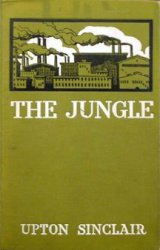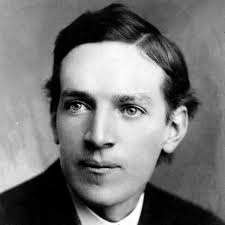The Jungle Page #12
The Jungle is a 1906 novel by the American journalist and novelist Upton Sinclair. Sinclair wrote the novel to portray the harsh conditions and exploited lives of immigrants in the United States in Chicago and similar industrialized cities.
Entering one of the Durham buildings, they found a number of other visitors waiting; and before long there came a guide, to escort them through the place. They make a great feature of showing strangers through the packing plants, for it is a good advertisement. But Ponas Jokubas whispered maliciously that the visitors did not see any more than the packers wanted them to. They climbed a long series of stairways outside of the building, to the top of its five or six stories. Here was the chute, with its river of hogs, all patiently toiling upward; there was a place for them to rest to cool off, and then through another passageway they went into a room from which there is no returning for hogs. It was a long, narrow room, with a gallery along it for visitors. At the head there was a great iron wheel, about twenty feet in circumference, with rings here and there along its edge. Upon both sides of this wheel there was a narrow space, into which came the hogs at the end of their journey; in the midst of them stood a great burly Negro, bare-armed and bare-chested. He was resting for the moment, for the wheel had stopped while men were cleaning up. In a minute or two, however, it began slowly to revolve, and then the men upon each side of it sprang to work. They had chains which they fastened about the leg of the nearest hog, and the other end of the chain they hooked into one of the rings upon the wheel. So, as the wheel turned, a hog was suddenly jerked off his feet and borne aloft. At the same instant the car was assailed by a most terrifying shriek; the visitors started in alarm, the women turned pale and shrank back. The shriek was followed by another, louder and yet more agonizing--for once started upon that journey, the hog never came back; at the top of the wheel he was shunted off upon a trolley, and went sailing down the room. And meantime another was swung up, and then another, and another, until there was a double line of them, each dangling by a foot and kicking in frenzy--and squealing. The uproar was appalling, perilous to the eardrums; one feared there was too much sound for the room to hold--that the walls must give way or the ceiling crack. There were high squeals and low squeals, grunts, and wails of agony; there would come a momentary lull, and then a fresh outburst, louder than ever, surging up to a deafening climax. It was too much for some of the visitors--the men would look at each other, laughing nervously, and the women would stand with hands clenched, and the blood rushing to their faces, and the tears starting in their eyes. Meantime, heedless of all these things, the men upon the floor were going about their work. Neither squeals of hogs nor tears of visitors made any difference to them; one by one they hooked up the hogs, and one by one with a swift stroke they slit their throats. There was a long line of hogs, with squeals and lifeblood ebbing away together; until at last each started again, and vanished with a splash into a huge vat of boiling water. It was all so very businesslike that one watched it fascinated. It was porkmaking by machinery, porkmaking by applied mathematics. And yet somehow the most matter-of-fact person could not help thinking of the hogs; they were so innocent, they came so very trustingly; and they were so very human in their protests--and so perfectly within their rights! They had done nothing to deserve it; and it was adding insult to injury, as the thing was done here, swinging them up in this cold-blooded, impersonal way, without a pretense of apology, without the homage of a tear. Now and then a visitor wept, to be sure; but this slaughtering machine ran on, visitors or no visitors. It was like some horrible crime committed in a dungeon, all unseen and unheeded, buried out of sight and of memory. One could not stand and watch very long without becoming philosophical, without beginning to deal in symbols and similes, and to hear the hog squeal of the universe. Was it permitted to believe that there was nowhere upon the earth, or above the earth, a heaven for hogs, where they were requited for all this suffering? Each one of these hogs was a separate creature. Some were white hogs, some were black; some were brown, some were spotted; some were old, some young; some were long and lean, some were monstrous. And each of them had an individuality of his own, a will of his own, a hope and a heart's desire; each was full of self-confidence, of self-importance, and a sense of dignity. And trusting and strong in faith he had gone about his business, the while a black shadow hung over him and a horrid Fate waited in his pathway. Now suddenly it had swooped upon him, and had seized him by the leg. Relentless, remorseless, it was; all his protests, his screams, were nothing to it--it did its cruel will with him, as if his wishes, his feelings, had simply no existence at all; it cut his throat and watched him gasp out his life. And now was one to believe that there was nowhere a god of hogs, to whom this hog personality was precious, to whom these hog squeals and agonies had a meaning? Who would take this hog into his arms and comfort him, reward him for his work well done, and show him the meaning of his sacrifice? Perhaps some glimpse of all this was in the thoughts of our humble-minded Jurgis, as he turned to go on with the rest of the party, and muttered: “Dieve--but I'm glad I'm not a hog!” The carcass hog was scooped out of the vat by machinery, and then it fell to the second floor, passing on the way through a wonderful machine with numerous scrapers, which adjusted themselves to the size and shape of the animal, and sent it out at the other end with nearly all of its bristles removed. It was then again strung up by machinery, and sent upon another trolley ride; this time passing between two lines of men, who sat upon a raised platform, each doing a certain single thing to the carcass as it came to him. One scraped the outside of a leg; another scraped the inside of the same leg. One with a swift stroke cut the throat; another with two swift strokes severed the head, which fell to the floor and vanished through a hole. Another made a slit down the body; a second opened the body wider; a third with a saw cut the breastbone; a fourth loosened the entrails; a fifth pulled them out--and they also slid through a hole in the floor. There were men to scrape each side and men to scrape the back; there were men to clean the carcass inside, to trim it and wash it. Looking down this room, one saw, creeping slowly, a line of dangling hogs a hundred yards in length; and for every yard there was a man, working as if a demon were after him. At the end of this hog's progress every inch of the carcass had been gone over several times; and then it was rolled into the chilling room, where it stayed for twenty-four hours, and where a stranger might lose himself in a forest of freezing hogs.
Translation
Translate and read this book in other languages:
Select another language:
- - Select -
- 简体中文 (Chinese - Simplified)
- 繁體中文 (Chinese - Traditional)
- Español (Spanish)
- Esperanto (Esperanto)
- 日本語 (Japanese)
- Português (Portuguese)
- Deutsch (German)
- العربية (Arabic)
- Français (French)
- Русский (Russian)
- ಕನ್ನಡ (Kannada)
- 한국어 (Korean)
- עברית (Hebrew)
- Gaeilge (Irish)
- Українська (Ukrainian)
- اردو (Urdu)
- Magyar (Hungarian)
- मानक हिन्दी (Hindi)
- Indonesia (Indonesian)
- Italiano (Italian)
- தமிழ் (Tamil)
- Türkçe (Turkish)
- తెలుగు (Telugu)
- ภาษาไทย (Thai)
- Tiếng Việt (Vietnamese)
- Čeština (Czech)
- Polski (Polish)
- Bahasa Indonesia (Indonesian)
- Românește (Romanian)
- Nederlands (Dutch)
- Ελληνικά (Greek)
- Latinum (Latin)
- Svenska (Swedish)
- Dansk (Danish)
- Suomi (Finnish)
- فارسی (Persian)
- ייִדיש (Yiddish)
- հայերեն (Armenian)
- Norsk (Norwegian)
- English (English)
Citation
Use the citation below to add this book to your bibliography:
Style:MLAChicagoAPA
"The Jungle Books." Literature.com. STANDS4 LLC, 2025. Web. 10 Jan. 2025. <https://www.literature.com/book/the_jungle_272>.




Discuss this The Jungle book with the community:
Report Comment
We're doing our best to make sure our content is useful, accurate and safe.
If by any chance you spot an inappropriate comment while navigating through our website please use this form to let us know, and we'll take care of it shortly.
Attachment
You need to be logged in to favorite.
Log In